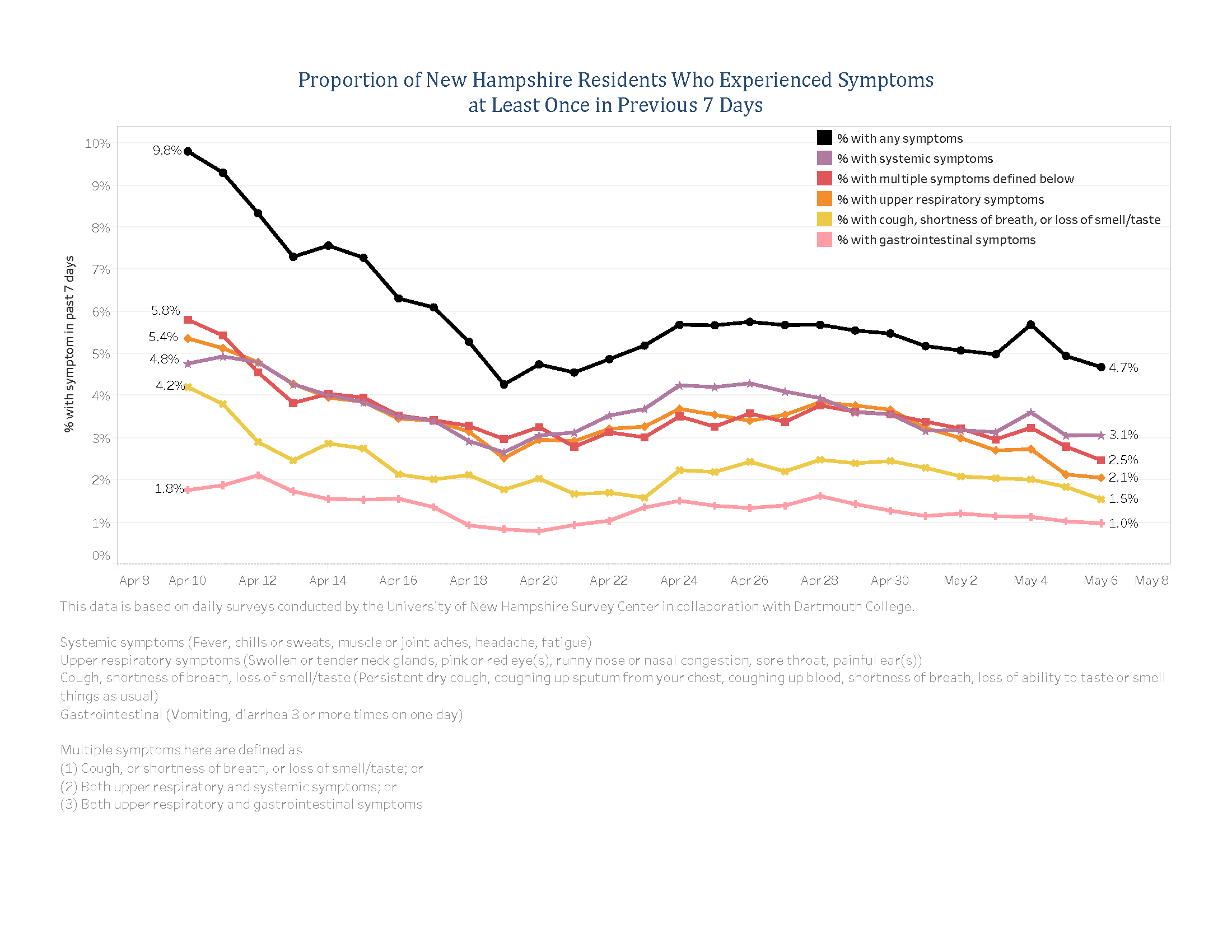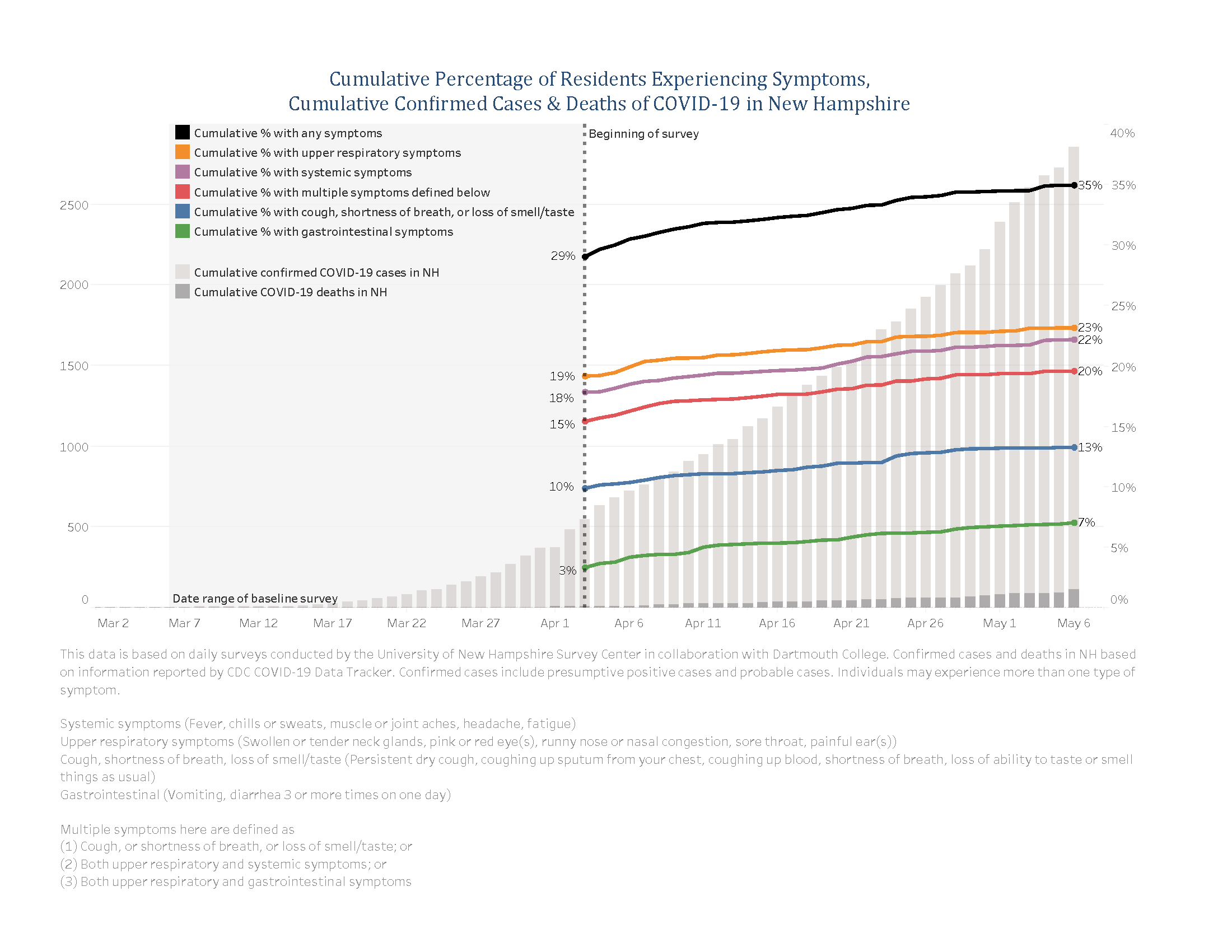
Geisel and UNH Share Updates from Statewide COVID-19 Survey
DURHAM, NH – A month ago, as New Hampshire entered the third week of its “stay-at-home” order, 9.8% of New Hampshire residents had experienced any symptoms during the previous seven days; currently, 4.7% have had symptoms in the past seven days. Only 1.5% have experienced cough, shortness of breath or loss of sense of smell or taste in the past seven days, down from 4.2% four weeks ago. Overall, just over one-third (35%) of Granite Staters have experienced any symptoms during the past eight weeks
Figure 1

Looking at symptoms residents experienced during the past seven days, 3.1% reported systemic symptoms (fever, chills, muscle aches, headache or fatigue), 2.1% reported upper respiratory symptoms (including swollen or tender neck glands, pink or red eye, runny nose or congestion, painful ear or sore throat), and 1.5% reported cough, shortness of breath or loss of sense of taste or smell. “This small decline in symptoms is encouraging because it suggests that social distancing may have had some effect in New Hampshire,” said Tracy Keirns, PhD, who oversees the collection of survey data at the University of New Hampshire.
Figure 2

The survey monitors symptoms reported from early March onwards. Overall, the total proportion of Granite Staters who have experienced any symptoms since early March has increased slightly from 29% in early April to 35% in early May. There have been small increases since early April in the cumulative percent who have experienced each type of symptom: upper respiratory symptoms (19% to 23%); systemic symptoms (18% to 22%); cough, shortness of breath or loss of sense of taste or smell (10% to 13%); and gastrointestinal symptoms (3% to 7%).
The total number of confirmed cases reported by New Hampshire since March 1 continues to rise steeply because of the dramatic increase in testing in the last few weeks, including testing of asymptomatic residents and staff at long-term care facilities. As of May 6, New Hampshire has reported 2,740 confirmed cases and 111 deaths (4%). [1]
“We don’t know which of the symptoms reported in this survey represent COVID-19 or other viruses, because testing has not been available to everyone with symptoms,” said Judy Rees, MD, PhD, of the Geisel School of Medicine at Dartmouth who co-leads the study with Keirns. “Usually at this time of year acute respiratory illnesses and influenza-like illnesses are decreasing [2] and that trend can be seen in our seven-day surveillance data. But overall, the number of people who have experienced any symptoms since early March is slowly rising—so we should take care during re-opening of the state and keep monitoring the trends.” The study will continue to follow these trends in symptoms as New Hampshire’s stay-at-home restrictions are relaxed.
Dartmouth College-UNH Survey Center New Hampshire COVID-19 Study Methodology
These findings are based on the Dartmouth College-UNH Survey Center New Hampshire COVID-19 Study, conducted by the University of New Hampshire Survey Center in collaboration with the Department of Epidemiology at the Geisel School of Medicine at Dartmouth. One thousand and twenty-nine (1,029) Granite State Panel members completed an initial survey online between April 3 and April 5, 2020 and nearly all (1,016) have completed at least one daily survey between April 4 and May 6, 2020 tracking their health symptoms. On any given day, approximately 74% (~800) have responded to the daily symptom survey. Data were weighted by respondent sex, age, education, and region of the state to targets from the most recent American Community Survey (ACS) conducted by the U.S. Census Bureau, as well as party registration levels provided by the New Hampshire Secretary of State. The Granite State Panel is part of an effort by the University of New Hampshire Survey Center to investigate new ways of gathering and understanding the opinion of New Hampshire residents.
Granite State Panel members are recruited from randomly-selected landline and cell phone numbers across New Hampshire. Respondents to the Granite State Poll were asked if they wished to participate in further research and to provide an email address. Those who agreed and provided an email address were added to the panel. Panel members were also recruited by texting a random sample of cellular telephones in the state and inviting the recipient to take a short survey.
For each survey which they complete, panel members are entered into quarterly drawings to earn rewards, such as gift certificates from statewide and internet companies.
Due to rounding, percentages may not sum to 100%.
For more information about the Dartmouth College-UNH Survey Center New Hampshire COVID-19 study, please visit:
https://cola.unh.edu/unh-survey-center/projects/dartmouthunh-covid-19-survey
For more information about the Granite State Panel, please contact Dr. Andrew Smith at (603) 862-2226 or by email at andrew.smith@unh.edu or visit:
https://cola.unh.edu/unh-survey-center/projects/granite-state-panel
This project is supported by emergency funding from The Hitchcock Foundation, the Jack and Dorothy Byrne Foundation, Dartmouth College COVID-19 "Spark" funding, and in-kind support by UNH Survey Center staff.
Founded in 1797, the Geisel School of Medicine at Dartmouth strives to improve the lives of the communities it serves through excellence in learning, discovery, and healing. The Geisel School of Medicine is renowned for its leadership in medical education, healthcare policy and delivery science, biomedical research, global health, and in creating innovations that improve lives worldwide. As one of America’s leading medical schools, Dartmouth’s Geisel School of Medicine is committed to training new generations of diverse leaders who will help solve our most vexing challenges in healthcare.
The University of New Hampshire inspires innovation and transforms lives in our state, nation, and world. More than 16,000 students from all 50 states and 71 countries engage with an award-winning faculty in top-ranked programs in business, engineering, law, health and human services, liberal arts and the sciences across more than 200 programs of study. As one of the nation’s highest-performing research universities, UNH partners with NASA, NOAA, NSF and NIH, and receives more than $110 million in competitive external funding every year to further explore and define the frontiers of land, sea and space.
[1] https://www.nh.gov/covid19/
[2] https://www.dhhs.nh.gov/dphs/cdcs/influenza/documents/weeklyflu.pdf